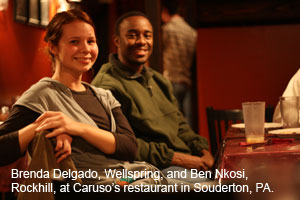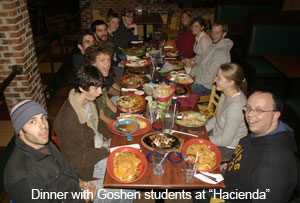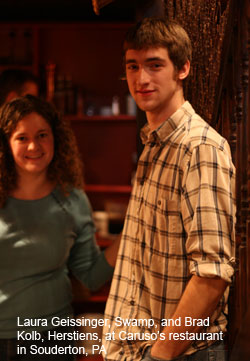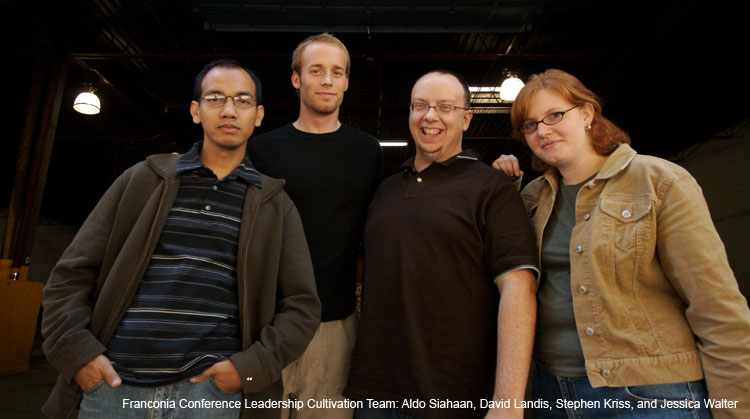 David Landis, dplandis@mosaicmennonites.org
David Landis, dplandis@mosaicmennonites.org
Associate for Communication and Leadership Cultivation
“When we’re all gone, this church will disappear,†stated an older gentleman from a church whose population of young adults is virtually nonexistent.
When I began working for Franconia Mennonite Conference in early 2006, it didn’t take much time to realize that many young adults are loosing connection with their home congregations, both unintentionally and intentionally. Many leave for college, begin an international service term or settle into jobs, shedding familiar connections to explore an adult role within their surrounding community.
As a young adult often feeling this same disconnect, my curiosity was sparked to investigate the situation. Though much has been presumptuously stated about why young adults are not connecting, it seems that a lot of what is heard are words and ideas not supported by experiential investigation.
In order to explore our questions, we decided to visit students from our conference’s congregations at various colleges. Food and drinks always seem to gather college students, so spaces were set up at restaurants and coffeehouses for conversation. We hoped to bring an atmosphere of hospitality to the students in a manner that wouldn’t beg them to come back to church, but rather honestly seek the best ways to mutually listen, understand, and support.
 Although it might seem obvious, we clearly discovered that the very act of going and listening is the most practical starting point for understanding each other. In a world where those close to us are often separated by vast geographic distance, it takes a lot of energy, time and financial investment to make these journeys. Yet these precious resources of our culture are what we sacrifice because we care. An incarnate sacrifice indicates that we are committed to actively pursuing relational understanding.
Although it might seem obvious, we clearly discovered that the very act of going and listening is the most practical starting point for understanding each other. In a world where those close to us are often separated by vast geographic distance, it takes a lot of energy, time and financial investment to make these journeys. Yet these precious resources of our culture are what we sacrifice because we care. An incarnate sacrifice indicates that we are committed to actively pursuing relational understanding.
The incarnation is a foundation of the Christian experience. In John 1:14, Jesus initiates his relationship with humanity when “the Word became flesh and dwelled among us.†Jesus came seeking new human relationships.
We all believe that relationships are the core of our meaningful experiences. Much energy in the church has been invested into the familiar phrase, “strengthening our personal relationship with God.†Young adults have directly and indirectly communicated that we understand what it means to be in relationship with God by how we are in relationship with others. As Jesus said, “Whatever you have done for the least of these, you have done for me.†We show how much we care by what we do.
Making the sacrifice to walk alongside each other on the journey indicates how much the relationship is valued. Many young adults do not hear from their home congregations while they are studying and serving far from home. Some have indicated that theyfeel their congregations view college or international experiences as a time to “sow wild oats†as prodigal daughters and sons, later to return to the way things have always been or suffer guilt otherwise. For many, these experiences are the first opportunity to freely explore difficult issues. This period of questioning is a time of trying to grasp how experiences interact with integrity to the world around us and nurture healthy, holistic relationships.
For many, the church has been a place that privileges those who seem perfect and successful. Idealistic morality is the socially rewarded goal, it’s a standard that all of us fall short of attaining. Our personal struggles are then the most difficult to discuss. By restraining from these difficult, personal conversations, we stress and damage the relationships within the community, eventually producing a desire to escape what seems like a facade.
 Much of the pain that estranges us from our church community is due to broken relationships. We grow up in a tightly connected group seeking to explore what it means to personally follow Jesus with our daily decisions. It’s a difficult process that often separates us from each other. For the church community to holistically engage this learning process, we need to be able to re-imagine how to move toward each other.
Much of the pain that estranges us from our church community is due to broken relationships. We grow up in a tightly connected group seeking to explore what it means to personally follow Jesus with our daily decisions. It’s a difficult process that often separates us from each other. For the church community to holistically engage this learning process, we need to be able to re-imagine how to move toward each other.
Our hospitality, whether social or theological, indicates the approachability of our community’s relationships. Hesitancy to begin the journey is perceived as fear from the perspective of those who are ready to explore the path ahead together.
Creating and sustaining these connections takes gracious energy. We need to show up and meet each other where we are at if we are going to take relationships seriously. We all know this is the truth, and we all desire it. We need to ask ourselves whether we are willing to courageously invest in this grace, whether we are going to make the journey?
All of us, young and old, do not want to suffer this journey of exploration alone. Young adults desire wisdom and guidance from older adults who are willing to ask difficult questions with them. Many older adults who have lived through difficult questions are waiting to be asked about them. We are all hesitant to approach that vulnerable moment where the incarnation becomes paradoxically personal and communal, where words become flesh to bring forth grace, truth and ultimately new life.



 Recently, the Franconia Conference Leadership Cultivation team created a networking group on
Recently, the Franconia Conference Leadership Cultivation team created a networking group on 

 By James M. Lapp, Senior Ministry Consultant, Franconia Mennonite Conference
By James M. Lapp, Senior Ministry Consultant, Franconia Mennonite Conference